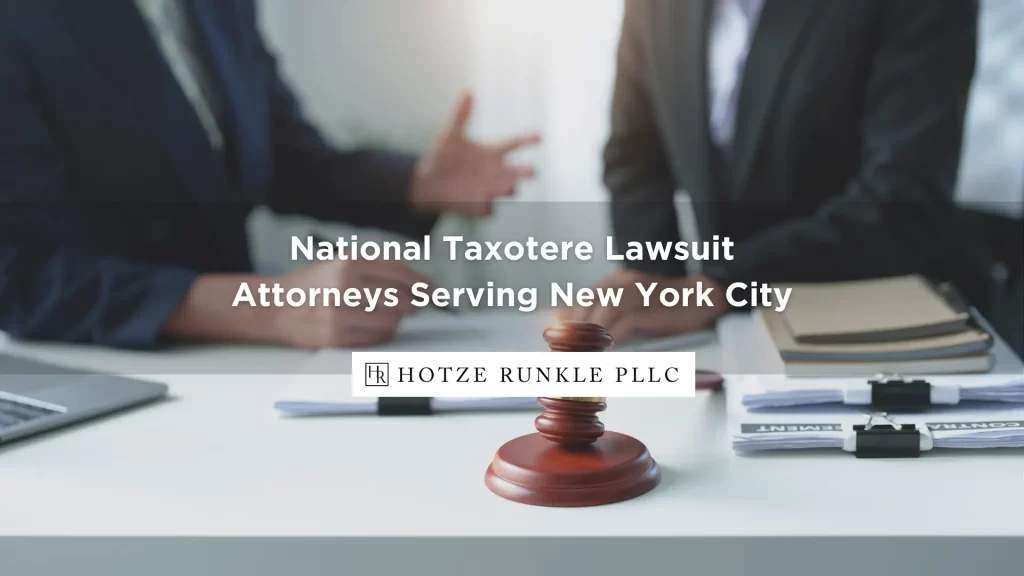
Studies have shown that the popular chemo drug Taxotere causes adverse reactions in cancer patients and survivors, including the development of a serious, irreversible ocular condition called canalicular stenosis.
If you have experienced excessive tearing during or following your treatment with the chemotherapy drug Taxotere, it’s important that you see an ophthalmologist immediately. A timely diagnosis of the early stages of canalicular stenosis can prevent the condition from worsening and may even prevent the possibility of invasive eye surgery.
The drug manufacturer, Sanofi-Aventis, created the Taxotere treatment to shrink cancer cells and prevent them from spreading. The drug is common in treating breast cancer, but can also treat neck cancer, prostate cancer, head cancer, and lung cancer.
Despite being successful in treating various forms of cancer, people started noticing serious side effects during and after their chemo regimen. Medical researchers exposed the dangerous link between Taxotere and canalicular stenosis long before Sanofi-Aventis released the drug’s side effects to the public.
Numerous cancer survivors have filed lawsuits against Sanofi-Aventis, alleging that the manufacturer knew about the negative impact of the drug, but hid them from the FDA and consumers. Currently, law firms throughout the United States, including Hotze Runkle PLLC, are pursuing cases against the pharmaceutical company for creating a drug that causes debilitating symptoms.
At Hotze Runkle PLLC, we have successfully represented cancer patients who have sustained injuries from chemotherapy drugs, and we can help you, too. We’re committed to holding Sanofi-Aventis responsible for their actions, and ensuring our clients receive the maximum compensation they need to rebuild their lives.
Get started by taking our brief, no-obligation Taxotere Quiz, and see if you may be eligible for compensation.
Symptoms Caused by a Taxotere Regimen
Whichever regimen of Taxotere you’re on, whether you’re on a weekly regimen of chemotherapy or receiving chemo every three weeks, you could develop symptoms of epiphora. Epiphora is the condition of having teary, watery eyes, and it could be accompanied by other symptoms, such as dry, irritated eyes.
Epiphora occurs when an infection forms in the canaliculus, a structure in the eye that filters tears into the nasal cavity. The tears have nowhere to go and build up on the surface of the eye, rolling down the cheeks.
Anyone suffering from the symptoms of epiphora understands it’s not just a minor inconvenience. It negatively impacts their daily life and prevents them from performing basic tasks, such as driving. It’s possible to manage epiphora symptoms with the help of an ophthalmologist, but it’s important to watch symptoms closely to prevent canalicular stenosis from developing.
What Is Canalicular Stenosis?
Epiphora goes away on its own if the cause is allergies or a cold. If the symptoms develop because of Taxotere, that could indicate a severe problem. If you don’t undergo the necessary treatment to alleviate your symptoms, it could turn into a serious condition known as canalicular stenosis.
Canalicular stenosis develops when chronic infections of the canaliculi cause partial or full closure of those tubes. The closure is permanent, and there’s no cure to reverse it.
The symptoms people affected by canalicular stenosis experience include:
- Excessive eye-watering
- Dry eyes
- Blurry or clouded vision
- Cystoid macular edema
- Headaches
- Sensitivity to light
- Eye infection
- Swollen eyelids
If you are being treated with Taxotere and develop watery eyes, you should monitor your symptoms and seek an evaluation by an ophthalmologist to prevent long-term issues. It’s possible to continue your chemotherapy treatment as long as your oncologist is aware of the Taxotere side effects you’re experiencing and closely monitors your health for any developing conditions.
Why Taxotere Causes Canalicular Stenosis
During chemotherapy treatment, a doctor administers Taxotere intravenously. As it travels through the body, it interacts with multiple bodily fluids, including tears. Medical researchers discovered that the direct contact between the drug’s secretions and a patient’s tears lead to inflammation of the canaliculi.
The interaction that occurs causes a blockage of the vital eye structure, preventing the tears from funneling through correctly. When tears are unable to travel to the nasal cavity, they build up in the eyes and get released uncontrollably.
Advanced cases of canalicular stenosis lead to the complete closure of one or both canaliculi. When it closes entirely, the condition is irreversible. The only solution to try to manage the symptoms is an invasive ocular procedure.
The Prognosis of Canalicular Stenosis
Unfortunately, canalicular stenosis is permanent. If you want to attempt to manage your aggravating symptoms, you could try DCR. DCR, or dacryocystorhinostomy, is a surgical procedure an ophthalmologist performs to create a new passageway for tears to pass into the nasal cavity.
The surgeon makes an incision beneath the eyelid to expose the bone and drills a hole in it. If it’s not possible to drill a hole, the doctor will place a stent to form the new passageway. The tunnel allows tears to bypass the closed canaliculus and drain into the nasal cavity, as normal.
For extreme cases of canalicular stenosis, patients can undergo CDCR. An ophthalmologist performs CDCR, conjunctivodacryocystorhinostomy, when they’re unable to create a new passageway from existing eye structures because the damage is too severe. During CDCR, the surgeon places a Jones tube (small glass tube) where the damaged canaliculus is to facilitate the movement of tears to the nasal cavity.
The eye and its surrounding structures are sensitive, making both DCR and CDCR risky surgeries with a range of potential issues. The most common side effects of the operations include:
- Sinusitis
- Infections
- Blindness
- Bleeding during and after the procedure
- Nasal structure or tissue damage
- Permanent facial scarring
- Canaliculus injuries
To make sure you receive the appropriate treatment for your specific symptoms, you need to speak to your ophthalmologist and oncologist. Just like any surgery, you’ll undergo a full evaluation to determine if you’re a candidate and have any health conditions that could increase the risks of the surgery.
What Kind of Settlement Could I Receive from Sanofi-Aventis?
There are many factors to consider when determining the value of an injured individual’s case. The most important details a jury will review include the following:
- The severity of the symptoms
- Visibility of any injuries related to canalicular stenosis or necessary treatment
- Length of time to recover
- Medical procedures performed
- The victim’s medical records
- Total costs incurred
While it’s not possible to determine the exact compensation you could win if you choose to sue Sanofi-Aventis, our New York City Taxotere lawyers will work to recover an amount that pays for your total damages. Damages are the losses, both financial and intangible, that occur as a result of an accident or injury.
The damages you could potentially pursue in a Taxotere lawsuit case includes:
- Medical costs
- Loss of earnings
- Physical pain
- Emotional or psychological trauma
- Loss of enjoyment of life
- Disfigurement or permanent disability
- Loss of consortium
- Punitive damages
In the state of New York, there’s a three-year statute of limitations you must adhere to if you want to file a lawsuit in a product liability case. That means you only have only three years from the date of your injury from Taxotere to pursue civil action against Sanofi-Aventis. If you want compensation for your damages, it’s a good idea to file suit immediately with the help of a lawyer.
Why it’s Important to Hire a New York City Taxotere Lawsuit Lawyer
 When you find out a chemotherapy drug meant to treat your breast cancer led to dangerous side effects, it’s devastating. Likely, your oncologist wasn’t aware of the potential symptoms because Sanofi-Aventis hid this information from physicians and consumers. Instead of notifying the FDA of the side effects and printing them on warning labels, the drug company decided to move forward with sales to make a profit at the expense of the patients.
When you find out a chemotherapy drug meant to treat your breast cancer led to dangerous side effects, it’s devastating. Likely, your oncologist wasn’t aware of the potential symptoms because Sanofi-Aventis hid this information from physicians and consumers. Instead of notifying the FDA of the side effects and printing them on warning labels, the drug company decided to move forward with sales to make a profit at the expense of the patients.
You’re probably stressed, struggling financially, and overwhelmed by legal proceedings. You shouldn’t have to face additional medical bills related to an eye condition that never should have developed in the first place. And you shouldn’t have to face a giant pharmaceutical company alone. An experienced lawyer will have the knowledge and resources to tackle a case of this magnitude.
There are deadlines for different stages of a lawsuit that, if missed, could get your case thrown out by the judge. If you’re unfamiliar with filing a lawsuit, you won’t know your rights or the maximum compensation you’re entitled to receive. With an experienced lawyer by your side, you won’t get taken advantage of or receive a low settlement offer.
Your lawyer will handle every legal detail of your case, while you focus on the healing and moving forward with your life.
Schedule Your Free Consultation with Hotze Runkle PLLC
Hotze Runkle PLLC knows how important it is for victims of another party’s negligence to be able to seek legal advice. Speak with a qualified New York City Taxotere lawyer today to find out more about your legal rights and options.
We will help you fight for the justice you deserve and ensure you win the maximum compensation available. This is a difficult time in your life, and you can depend on us to be there with you from beginning to end of your case.
If you developed canalicular stenosis symptoms from Taxotere, and want to find out if you qualify for a lawsuit, take our Taxotere quiz.